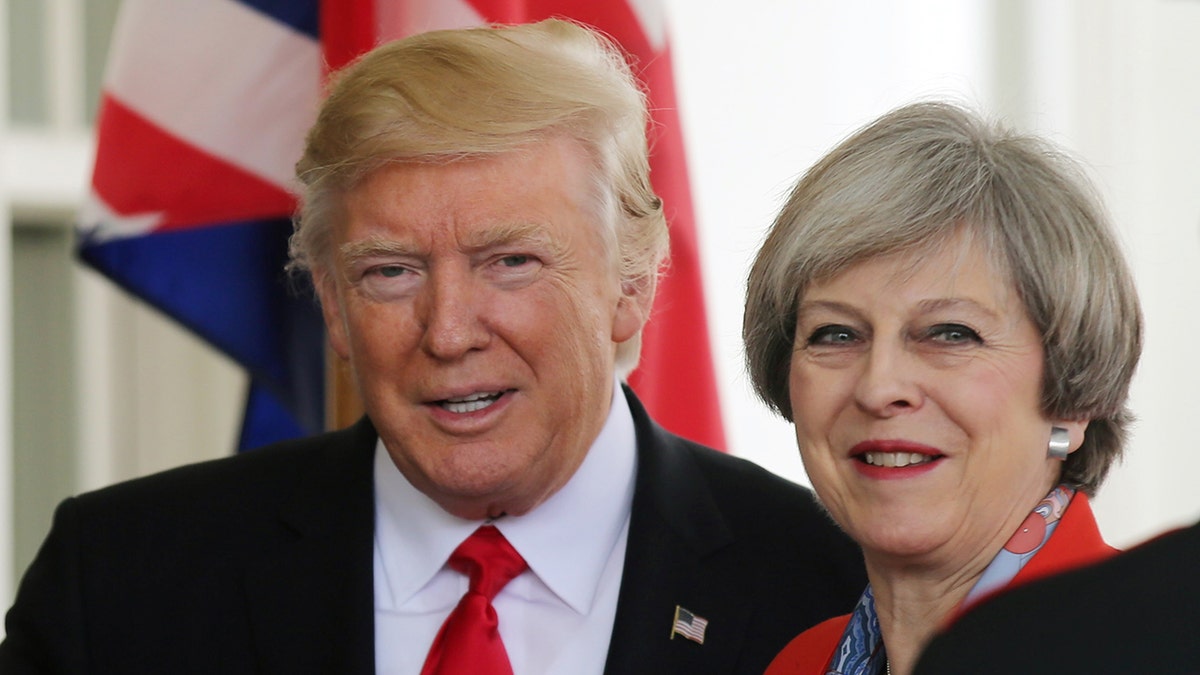
Jan. 27, 2017: U.S. President Donald Trump greets British Prime MinisterTheresa May as she arrives at the White House in Washington. (Reuters)
President Donald Trump will have to learn some new names in London. Earlier this week, Foreign Secretary Boris Johnson and David Davis, who led Britain’s arrangements for exiting the EU, resigned out of dissatisfaction with the government’s plans for Brexit.
On the surface, this looks like a bad time for Trump to arrive. Actually, it’s ideal.
The resignations happened because much of the British government — including Prime Minister Theresa May — treat Brexit as a problem to be managed, not an opportunity to be exploited. Most Tory activists want to leave the EU, as does a narrow majority of Conservative Members of Parliament (MP).
The Conservative Party is formally committed to leaving, and the fact that Britain will be exiting is enshrined in law. But May and her fellow Remainers want what’s known as a Kit-Kat Brexit — a coating of Brexit hiding a wafer of Remain.
Johnson and Davis resigned because the government’s effort to decide what it wants out of Brexit — known as the Chequers Plan--wouldn’t actually take the U.K. all the way out of the EU.
The Plan calls on Britain and the EU to develop a “common rule book” for goods. In practice, this would give the EU a veto over Britain’s ability to negotiate free trade deals with other nations, including the U.S. Nor would it give the U.K. much in other areas that it cares about.
Moreover, there’s no reason to believe the EU would agree to the Chequers Plans. The EU has consistently argued that Britain can’t have full access to the EU’s Common Market in goods unless it accepts the free movement of people — in other words, uncontrolled immigration.
And since the Chequers Plan is only Britain’s starting proposal, it will certainly be watered down even further as Britain negotiates with the EU.
The dissatisfaction in the Conservative Party isn’t limited to Johnson and Davis. The Chequers Plan is widely regarded as a betrayal of the Brexit Referendum, of the Party’s commitment to leaving, and of the promises that May herself has made.
In normal times, this might lead a Conservative MP to challenge May’s leadership. And that might indeed happen. But right now, almost no one wants an election. The British people are tired of them. The Conservative Party isn’t ready. It would enter the election divided, and that rarely leads to smashing victories. In short, May is powerful precisely because she is weak: If Conservative MPs got rid of her, many of them might lose their jobs in the resulting election.
None of this will be settled soon. It’s hard to see how the Chequers Plan can survive in its current form. Moves are already afoot in the Commons against it. And it’s hard to see how even a government as spineless as the one led by Theresa May could accept the EU’s likely demand that Britain keep its borders open.
And if it does, the Conservative Party — and indeed Labour — will face with another political rebellion, similar to the one that created the now nearly-defunct U.K. Independence Party (UKIP).
The U.S. can play an important role in this crisis, though not a decisive one. Donald Trump is not popular in Britain. (Expect to read about major protests in London on Friday.) And Trump and May do not enjoy a close personal friendship.
But Trump does bring something worthwhile: a strong commitment to negotiating a free trade area with Britain as soon as possible. Of course, the U.K. will want to do deals with many countries, but the U.S. matters more than anyone else.
May has already admitted that the Chequers Plan creates “a challenge for us in relation to the United States and standards”—a polite way of admitting that the U.K. cannot hope to do a deal with the U.S. based on mutual recognition of standards if it is committed to agreeing on standards with the EU.
As the U.S. Ambassador to the U.K., Woody Johnson, has said, the Chequers Plan has left a US-UK trade deal “totally up in the air.”
Trump’s to-do list in Britain is both short and important. After congratulating Britain on spending 2 percent — or close to 2 percent — of its GDP on defense, he should tell May that he will move heaven and earth to conclude a free trade agreement with Britain by the time it formally exits the EU, at the end of March 2019 — but that he can do this only if Britain isn’t bound by an EU rulebook.
That is a plain statement of fact. It is also what the Australians — among others — have already told the British. Whether this will be enough to encourage the British government to drop its defensive attitude to Brexit is impossible to know. But Trump needs to say this as clearly, as convincingly, as repeatedly, and as publicly as he possibly can.
The alternative is simple: Britain remains de facto in the EU; it is drawn into promoting the EU’s regulatory agenda; the Conservative Party loses the next election to Jeremy Corbyn’s far-left Labour Party, and Trump enters 2020 having done nothing in trade except impose tariffs on all and sundry.
Trump may not be able to avert this. The May government may be bent on throwing away its opportunities, no matter what he says. Or May’s own opponents may bring her down. But if Trump does not try, the best opportunity to rescue the situation, and Trump’s own legacy on trade, will be lost.
